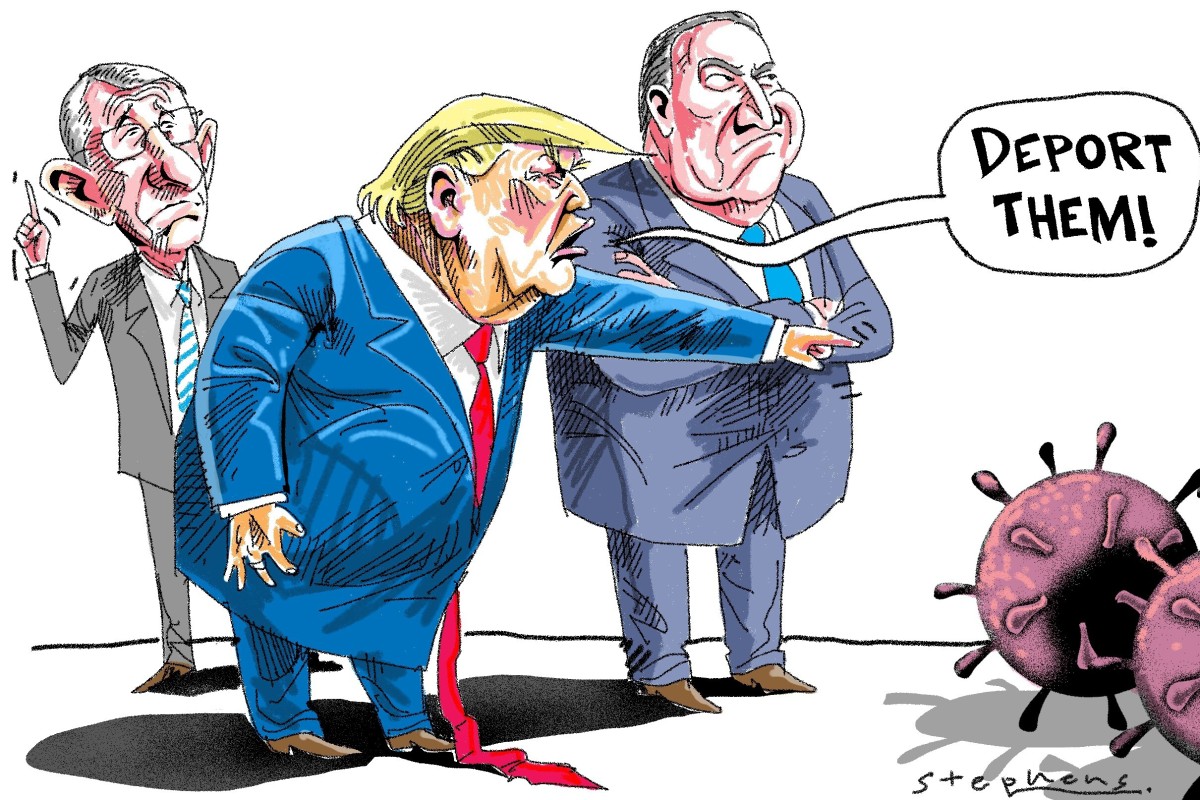Consigning the problem to the Chinese regime and culture – ‘the other’ – has just bred negligence and hubris in the West, which contributed to delays in containing the outbreak and wasted the precious head start China won with its draconian lockdowns
Bai Tongdong Published: 9 Apr, 2020

Consigning the problem to ‘the other’ – China’s regime and culture – has just bred negligence and hubris in the West, writes Bai Tongdong. Illustration: Craig Stephens
US Secretary of State Mike Pompeo has used “ Wuhan virus,” and, until recently, President Donald Trump often used “ Chinese virus,” to refer to the novel coronavirus. These terms contribute to the discrimination against East Asians in America and Europe. Their use has also been criticised as an attempt to cover up the failure of the American government’s responses to the outbreak.
A more serious problem is that the idea implicit in these terms – that the outbreak is a Chinese problem – and the negligence and hubris associated with it, contributed to a Western failure to properly respond to the outbreak. The danger is that humanity learns the wrong lesson and blindly awaits the next disaster, after paying a terrible price this time.
For some, the origin of the pandemic is the problem of “the other”, in that the outbreak originated in the “weird” and “backward” eating habits of Chinese. But anyone with just a basic knowledge of the history of pandemics should know that the main sources of contagion are livestock and other animals (such as rats) that have been with us since humans became settled farmers.
We have had many diseases from these animals in the long history of agrarian life and, as a result, have developed either immunity or treatments. The real danger of eating exotic meat is to introduce a new source of contagion.
But increased human exposure to nature through economic activity and tourism also brings new sources of contagious diseases, such as the Zika virus and Lyme disease. The focus on the meat of exotic and wild animals is thus misleading.
Moreover, the danger of consuming exotic meat does not come from the occasional eating of game by a hunter or a wealthy man in an isolated area, but from the large demand from China’s fast-growing middle class for what were once rare delicacies for the wealthy or the isolated few. This demand leads to problems of how to regulate the raising, transport and slaughter of these “wild” animals as well as “normal” livestock.
Therefore, if there is a cultural issue, it is about a fast-growing middle class in an industrialised country, in a globalised world, that still holds on to the attitudes of its agrarian and relatively isolated past. The focus should be on the regulation of the whole process of bringing meat to consumers, and of human encroachments on nature: a pressing political problem in this globalised and industrialised world.
Some people also believe that the cause of this pandemic is the Chinese regime, “the other” to the Western liberal democratic regime. It is true that although the Chinese government failed to regulate wet markets and people’s mouths, in terms of what they eat, it has
succeeded in shutting people’s mouths in terms of what they say.
China orders complete ban on trade in wildlife for food to combat coronavirus epidemic
Some people then conclude that this outbreak must be a failure of “the other” regime, as well as “the other” culture. However, partly due to the complacency of such thinking, many Western democratic countries have failed to respond to the outbreak properly.
To be sure, other countries’ failure to respond is different from China’s failure to kill the spread in its infancy. But could liberal democracies guarantee that they would be able to suppress a similar outbreak?
Chinese leaders suppressed information because they thought the spread was under control, and if they had known what would happen, they would probably have taken drastic action earlier to control the spread, although they may still have silenced people.
Trump says US approaching a ‘horrendous’ time as coronavirus death toll rises
But since the Wuhan lockdown on January 23, in spite of possible government suppression of information, the terrible power of this new virus has been obvious, yet many Western democracies still failed to respond properly, in spite of the weeks of preparation time China won for the West through its draconian lockdowns.
Trump claimed that the summer heat would kill the virus (and the threat to his re-election), and politicians in the West had all sorts of reasons to ignore the threat. One cannot help but wonder, is it necessarily the case that a free and democratic society could do better?
It should be common knowledge among political observers that effective governance is not necessarily the strong suit of liberal democracies. Rather, the true merits of a liberal society are its freedom of the press and information, and its rule of law. This does not guarantee a timely response to a virus outbreak, but at least whistle-blowers would not have been harassed by the police, and people’s anger would not be suppressed online through permanently blocking their accounts in an arbitrary manner.
But are we doomed to choose between dying with our anger suppressed or dying with our emotions vented? Can we not combine effective governance and free speech?
Singapore tolerates far more freedom of information than China, and South Korea is a liberal democracy.
Their responses to the pandemic have been relatively successful so far, although their situations have not been as dire as in China’s Hubei province. As I argue in my book, Against Political Equality: The Confucian Case, the democratic part of a liberal democracy contributes to the ineffectiveness of governance and may even threaten the “liberal” part.
The solution is a hybrid regime that combines the voice of the people through popular elections with more decision-making power given to the “meritocrats”, people such as
Dr Anthony Fauci, which is firmly built on the protection of rights and the rule of law.

Globalisation blurs the boundaries between the self and the other, and the dilemma is that this process of transcending nations is led by nation states. International organisations such as the World Health Organisation and the United Nations are toothless.
The solution, then, may be an alliance of the humane (the Confucian idea of ren) and great powers that police the world under the banner of “humane duty overrides sovereignty”. Unfortunately, given the obsession with blaming “the other”, the future of humanity remains uncertain.
Bai Tongdong is a professor of philosophy at Fudan University in China and the author of Against Political Equality: The Confucian Case

Bai Tongdongis a professor of philosophy at Fudan University in China and a global professor of law at NYU’s Law School
Their responses to the pandemic have been relatively successful so far, although their situations have not been as dire as in China’s Hubei province. As I argue in my book, Against Political Equality: The Confucian Case, the democratic part of a liberal democracy contributes to the ineffectiveness of governance and may even threaten the “liberal” part.
The solution is a hybrid regime that combines the voice of the people through popular elections with more decision-making power given to the “meritocrats”, people such as
Dr Anthony Fauci, which is firmly built on the protection of rights and the rule of law.
Globalisation blurs the boundaries between the self and the other, and the dilemma is that this process of transcending nations is led by nation states. International organisations such as the World Health Organisation and the United Nations are toothless.
The solution, then, may be an alliance of the humane (the Confucian idea of ren) and great powers that police the world under the banner of “humane duty overrides sovereignty”. Unfortunately, given the obsession with blaming “the other”, the future of humanity remains uncertain.
Bai Tongdong is a professor of philosophy at Fudan University in China and the author of Against Political Equality: The Confucian Case

Bai Tongdongis a professor of philosophy at Fudan University in China and a global professor of law at NYU’s Law School
No comments:
Post a Comment